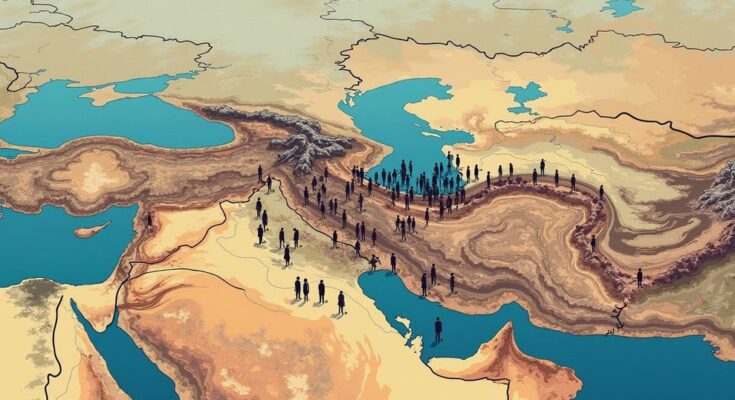In her first report, UN Special Rapporteur Mai Sato sheds light on urgent human rights violations in Iran, outlining priorities such as transparency, gender equality, and the right to life. The Iranian government’s defensive stance and refusal to grant access to international monitors underscore ongoing repression. Sato calls for international cooperation to support her mandate and improve human rights conditions in Iran.
In September 2024, a significant chapter in international human rights advocacy unfolded as Mai Sato, the freshly appointed UN Special Rapporteur on human rights in Iran, presented her inaugural report to the General Assembly. This pivotal document serves as a beacon, shedding light on the pressing human rights concerns prevailing within the Islamic Republic of Iran. Sato’s report not only delineates the challenges she aims to tackle but also espouses a vision built on accountability and transformation, unveiling her critical priorities in a country marked by systematic oppression of its citizens. Sato’s report elaborates on her mandate, established under the auspices of the Human Rights Council. Her responsibility is twofold: to meticulously monitor and document human rights violations while simultaneously advocating for the rights of the Iranian populace, whom she poignantly terms “rights holders.” The Iranian government, however, has responded defensively, fervently asserting its commitment to human rights, all the while denouncing international pressures as veils of Western impositions clashing with faith-based values. This dissonance underscores Sato’s urgent clarion call for increased dialogue and transparency, as Iran has denied access to international observers since 2011. Among the three chief priorities laid out by Sato—data transparency and the right to truth, a gender-focused approach, and the right to life—each articulately responds to the chronic human rights abuses that stifle the Iranian people. The labyrinth of opacity surrounding human rights data in Iran forms a formidable barrier to understanding the extent of violations faced by individuals. Sato emphasizes that access to reliable information is not merely a bureaucratic necessity but a cornerstone of human dignity and rights, urging the Iranian government to shatter this silence. As waves of societal upheaval resonated through Iran following the stirring “Woman, Life, Freedom” movement, Sato’s emphasis on gender violence received stark urgency. Her report brought to the forefront the troublesome Chastity and Hijab Bill, a reflection of the state’s archaic views on womanhood that imperiously override individual autonomy. With the statistics underscoring Iran’s lamentable status in gender equality, ranking remarkably low on global indices, Sato’s lens encompasses the intersectionality of oppression faced by not just women, but also marginalized communities. However, perhaps the most striking revelations in Sato’s report pertain to the spiraling execution rates in Iran. An alarming surge saw 93 executions in one month—many for non-violent drug offenses. Sato’s assertion that these practices violate international standards casts a grim shadow on the very fabric of legal protections within Iran, opening a Pandora’s box of systemic failures that inhibits justice and liberty. Furthermore, Sato’s observations extend to the myriad unresolved human rights infractions including the suppression of minority religions, the absence of judicial independence, and the alarming treatment of political dissenters. Despite minor legal reforms in the past, the status quo reflects a disheartening stagnation in the quest for justice and equality. In her closing remarks, Sato passionately beckons for enhanced international partnership to address these dire human rights issues. Inviting states, civil entities, and UN bodies to rally behind her cause, she reiterates the need for Iran to permit unimpeded access for human rights monitors, a crucial step towards building trust and fostering meaningful change within the nation. Mai Sato’s inaugural report emerges as both a clarion call and a roadmap, illuminating the path toward greater accountability amidst Iran’s turbulent human rights landscape. Her emphasis on transparency, gender equality, and the sanctity of life not only outlines her agenda but also crystallizes the shared responsibilities that fall on the shoulders of the international community, reminding us that the pursuit of justice is not merely an ideal but an urgent collective necessity.
The report by Mai Sato, the UN Special Rapporteur on human rights in Iran, emerges in a complex backdrop of persistent human rights abuses within the Islamic Republic. Appointed in 2024, Sato’s role was established by the Human Rights Council to critically monitor and advocate for the rights of individuals oppressed by systemic violations. Iran has faced international criticism for its chronic lack of transparency, infringement of civil rights, and state-sanctioned gender discrimination, especially against women and minority groups. In particular, tensions have escalated recently following the rise of movements demanding gender equality and social freedoms. The backdrop of Sato’s report thus encapsulates a dire need for reform, transparency, and accountability, aiming to highlight the lived experiences of those suffering under an oppressive regime.
Mai Sato’s first report serves as both an urgent call to action and a tactical guide for addressing the entrenched human rights violations in Iran. Her focus on transparency, gender equity, and the fundamental right to life underscores the multifaceted nature of oppression while highlighting the complexities of engaging with the Iranian state. As the world watches, Sato’s mandate stands as a pivotal player in the endeavor to reform and restore justice to the lives of those silenced by years of systematic abuse, urging collaborative efforts to advocate for a brighter future for the Iranian people.
Original Source: irannewsupdate.com



